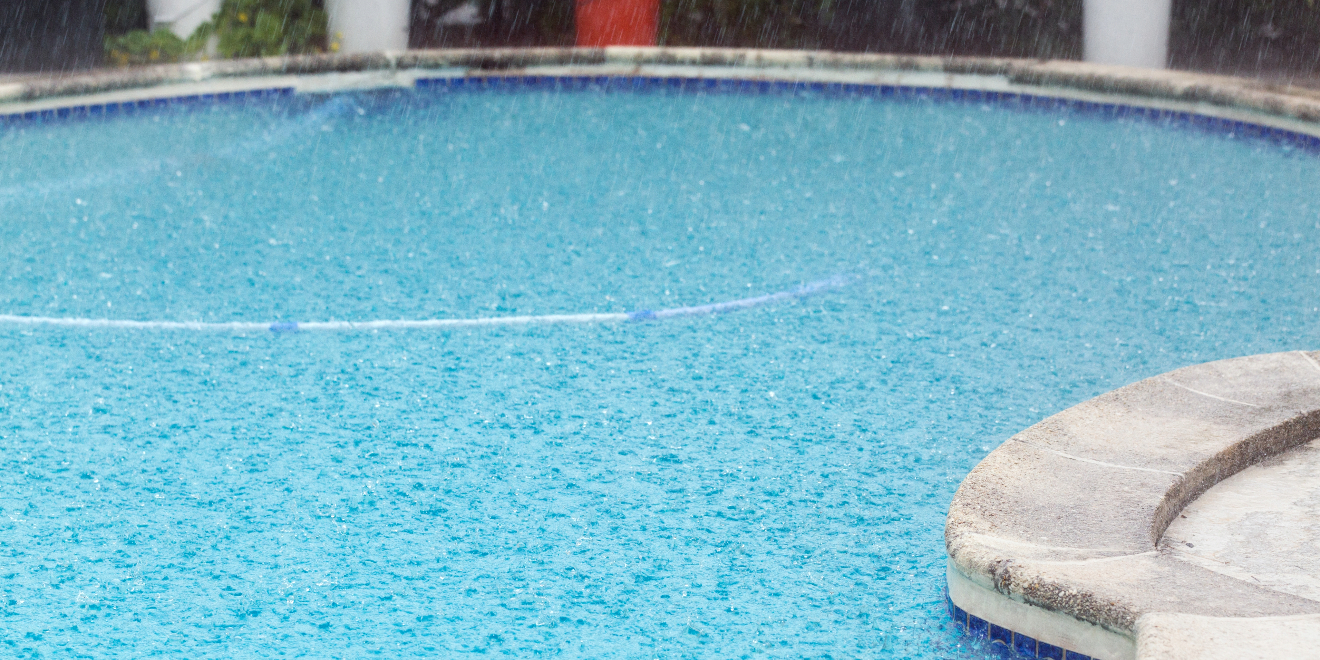When it comes to pool maintenance, managing water chemistry is one of the most important things. Pool water chemistry that’s unbalanced can give swimmers face, skin, and eye irritation.
The reality is that even with a properly installed pool cover, your pool will get some rainwater in it, either from direct rain or flooding in your backyard.
Happily, small quantities of rain shouldn’t affect your pool’s chemistry, but the more rain that gets in your pool, the more likely your pH level will be thrown out of its delicate balance.
Read on to learn more about the effects of rainwater on your pool and how you can make corrections.
The Importance of Pool Water Chemistry
Properly maintained water chemistry is built around a ratio of chemicals to water, usually indicated in parts per million. It’s important to remember that any additional water added to the pool during a rainstorm (or added intentionally by you) will affect your pool water’s chemistry.
Is a Large Amount of Rainwater in a Pool Okay?
It’s certainly not ideal. Pools are kept safe through a balance of chemicals designed to clean and maintain water pH. Large quantities of precipitation can dilute the existing pool chemicals or introduce other compounds to your pool, which can lead to algae growth.
Is It Safe To Swim in a Pool After Rain?
It depends. The biggest deciding factors will be your pool’s water chemistry and the clearness of the water. As long as your various chemical levels are all within acceptable ranges it will be safe to swim. In the case of light rain or heavy rain when your pool is covered, you’ll probably find safe levels or ones that need minor work to correct.
If your pool water has any discoloration, then there’s probably algae growth beginning, and you’ll need to correct this before swimming again.
Does Rain Raise pH in Pool Water?
No. A large amount of rainwater is most likely to lower the pH of your pool’s water.
With a typical pH of around 5.6, rainwater is almost always acidic. Even though it’s only slightly acidic, it’s still corrosive enough that you could see damage to your pool equipment and skin and eye irritation as a result. Acidic pool water may appear cloudy. (The scale measures pH from 0 to 14; 7 is considered neutral. Anything above 7 is basic, a measurement below 7 is acidic.)
Does Rain Cause Algae in Pool?
Indirectly, yes. Rainwater will not cause algae growth, but it can contribute to it. A pool at optimal water chemistry is set to stunt the growth of algae by killing any organic material that algae will use to bloom. Although rainwater doesn’t contain inorganic materials like phosphates and nitrates, it can help introduce them to your pool. When rain lands in your yard and drains into your pool, phosphates and nitrates from the dirt can be brought in. Large quantities of rainwater will imbalance these chemicals allowing these materials to flourish in your pool water. The introduction of rainwater combined with abundant light and warmth may allow algae to grow.
It’s a simple fix, though. You can prevent the growth of algae by rebalancing your pool’s chemicals. If you’re too late and algae is already present from previous rain, you’ll need to kill the algae to make your pool safe for swimming.
What Causes Green Water in a Pool After Rain?
Green pool water is almost always caused by algae, especially if your pool turns green shortly after heavy rain.
If your pool water has turned green independent of rain, you probably have an issue with your pump, filter, or other circulation equipment. Regardless of the cause, you should always address green pool water before swimming in it.
How to Clear Cloudy Water in Pool After Rain
If your pool water turns cloudy, you’ll need to get it clear again before swimming. Follow these four steps to make sure your water chemistry is back to its pre-rain levels:
- Skim debris: Heavy rain can bring all types of debris to your pool like leaves, sticks, and mud. These will eventually work their way into your filter and cause clogging. Make sure to remove any debris before you start running your filter.
- Drain excess water: If there was enough rain to disrupt your pool’s chemistry, then there was probably also a rise in the overall water level. Make sure to drain back down to your desired level before rebalancing your pool’s chemical levels. If you adjust your chemistry and drain the excess, you’ll just have to adjust your chemistry again.
- Check the chemical levels: Your pool has three main levels you’ll need to check: pH, calcium, and alkalinity. Your pH should be between 7.2 and 7.6. After a rain, your pool’s pH will probably be below 7 and need to come up. Calcium hardness should be kept between 180 and 220 parts per million, while alkalinity should be 100-150 ppm.
- Filter the water: Let your pool’s filtration system get to work. Your system should be running during the first steps, but don’t retest your water until your water is clear again. Depending on how cloudy the water has become, this process could take a few days (before you finally have that crystal-clear water again).
Should I Use Baking Soda in My Pool After Rain?
Baking soda can help kill algae and make your water clear again after a heavy rain. Rainwater will lower your pool’s pH, making it more acidic. Baking soda, in addition to killing algae and making your water look clear again, will help raise your pool’s pH back to a safer number. A ratio of 1.5 pounds of baking soda for every 10,000 gallons of water should do the trick.
Guarantee Your Pool Chemistry Is Balanced Properly by Hiring ASP
After a heavy rain or backyard flooding, trust the technicians at your local ASP—American’s Swimming Pool Company—to get your pool swim-ready again. Call us today at (866) 253-0455 or request service online.


